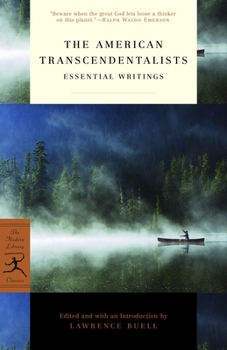The American Transcendentalists: Essential Writings
Select Format
Select Condition 
Book Overview
Transcendentalism was the first major intellectual movement in U.S. history, championing the inherent divinity of each individual, as well as the value of collective social action. In the mid-nineteenth century, the movement took off, changing how Americans thought about religion, literature, the natural world, class distinctions, the role of women, and the existence of slavery. Edited by the eminent scholar Lawrence Buell, this comprehensive anthology...
Format:Paperback
Language:English
ISBN:081297509X
ISBN13:9780812975093
Release Date:January 2006
Publisher:Random House Publishing Group
Length:608 Pages
Weight:1.13 lbs.
Dimensions:1.3" x 5.3" x 8.0"
Customer Reviews
2 ratings
from the Horse'e Mouth
Published by Thriftbooks.com User , 16 years ago
In his excellent memoir, "Confessions of a Philosopher", Bryan Magee observed that in his experience it was much better to read the actual writings of philosophers than to read books about those writings. This compilation of `essential writings' of American Transcendentalists supports Magee's observation. Buell is one of the premier scholars of the transcendentalist movement and seems to have chosen his selections with a good deal of care. Once the modern reader overcomes the culture shock of dealing with the eloquent and leisurely style of these mid-19th Century writers and thinkers, these selections explain the principles and goals of the transcendentalist movement very well indeed. As an example, one of them, George Ripley, defines transcendentalism as a belief in an "order of truths which transcends the sphere of external senses" (pp105), a wonderfully lucid definition. As the reader works through these writings it becomes clear that the transcendentalist also shared Immanuel Kant's distrust of reason exclusive of individual experience as well. Buell also includes a sampling of the opponents of the movement, such as Andrews Norton, who no less eloquently, argued against transcendentalism and clearly identified the threat he thought it presented to traditional (if such a term applies) Unitarianism and established Christianity in general. Buell also includes some of the writings of Henry David Thoreau, who might be said to be a practicing transcendentalist. If there is a criticism of this book it is that one wishes some the selections were a bit longer. For example, Buell gives only the short excerpt from Frederic Hedge's essay, "The Significance of Kantian Philosophy." Hedge known as the best German scholar of the transcendentalists was a long time student of German idealism and one would guess the his essay is probably the most complete accounting of American thinking on the great German idealist philosopher. This reader would have preferred the entire essay. Also more information on the American understanding of neo-Platonism would have been helpful. Still the book is an excellent introduction to the first important U.S. intellectual movement that was a uniquely American interpretation of the German (and Platoist) idealist philosophical system.
Chockful of thought-provoking selections
Published by Thriftbooks.com User , 18 years ago
When we think of Transcendentalism, we first turn to Ralph Waldo Emerson and Henry David Thoreau. But the literary movement was made up of more personalities than just those two men; and while "Nature" and "Walden" are key writings, they're not the only examples anyone can or should read. Hence the need and attraction of any transcendental anthology: it brings us multiple voices, perhaps even some unfamiliar or unusual ones. This volume is a treasure-trove of transcendental goodies, containing more than 100 selections from 32 writers. Emerson's "Nature" and part of Thoreau's "Walden" are here, along with dozens of essays, sermons, and poems from a variety of personalities, men and women, too numerous to mention. Some pieces will be familiar to anyone who's read about the mid-1800s; others are refreshlingly new to most of us. Thanks to reading this book from cover to cover, I have discovered that I like Theodore Parker's writing quite a bit. I may have to stray off my Thoreauvian path and delve into Parker a bit more. And yet, I disagree with some of the editor's observations in this volume. Unlike Buell, I don't think Thoreau considered surveying "a day job he didn't particularly care for," and I'm fairly certain he was never a member of the American Association for the Advancement of Science. I'm also not fond of the titles Buell created for some of the selections, because that method makes it difficult to compare his anthology with others or with the original works. For example, what is labelled here as Thoreau's "Christianity and Hinduism Compared" is really a portion from the book "A Week on the Concord and Merrimack Rivers." "A Walk to Walden" by Nathaniel Hawthorne is really an excerpt from "The American Notebooks." But the sheer diversity, variety, and thematic arrangement of the selections far out-weighs any misgivings about their titling. If you are interested in transcendentalism, this is a wonderful book to start with. It's a nicely-priced paperback that's easy to carry around, which is important, because it'll take you a while to pore over and absorb (or even skip) its entries. In addition, three older anthologies of transcendental writings may interest readers: "Transcendentalism: A Reader" (Joel Myerson, ed., 2000); "The Transcendentalists: An Anthology" (Perry Miller, 1977), and "The American Transcendentalists: Their Prose and Poetry" (Perry Miller, 1957). Each anthology has a focus, and surprisingly little overlap occurs when comparing their contents. And each contains a few jewels not found in any other contemporary anthology. Happy hunting!






